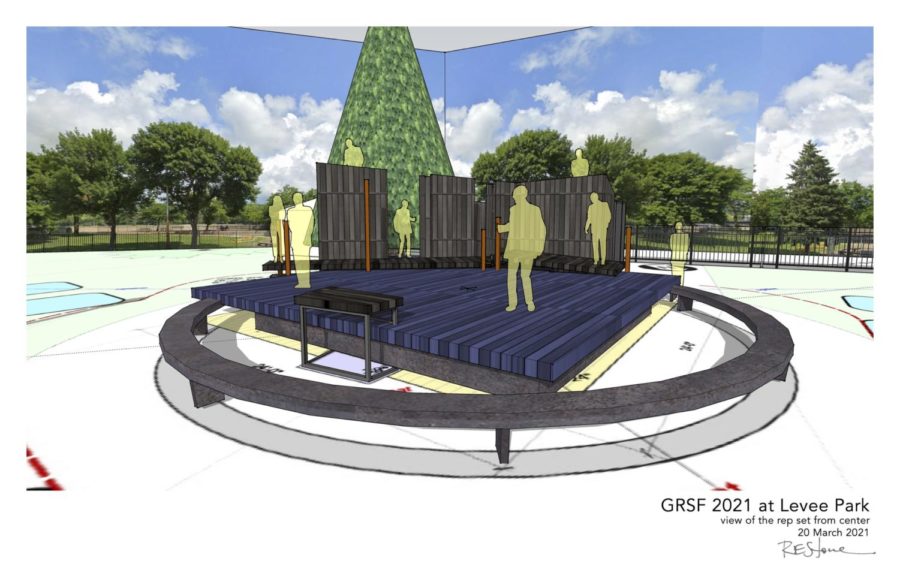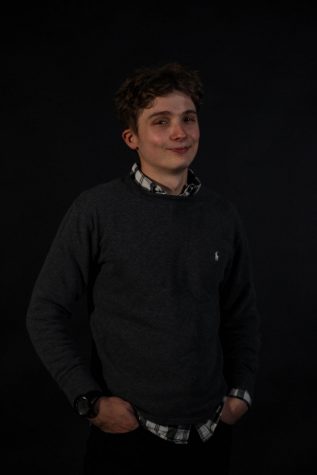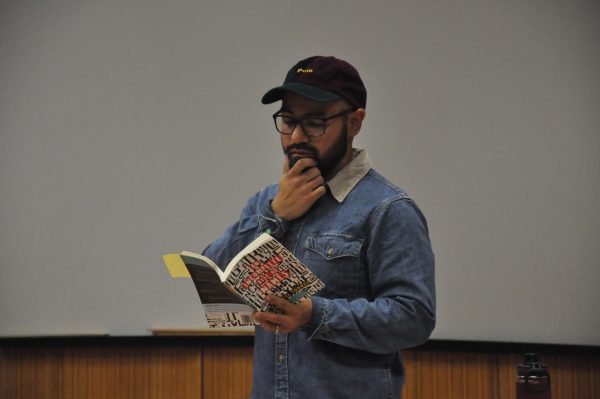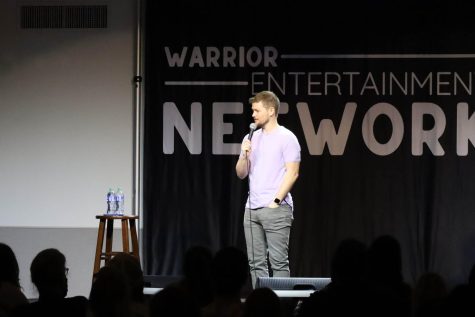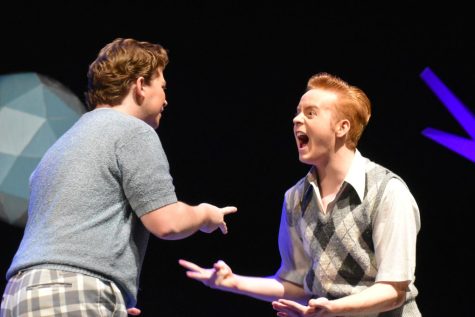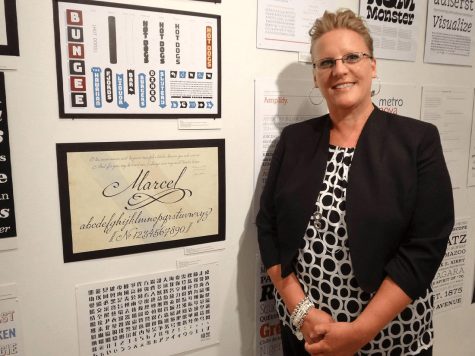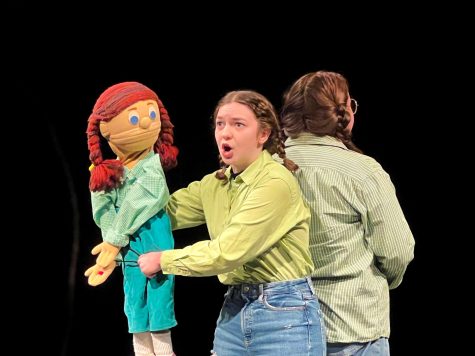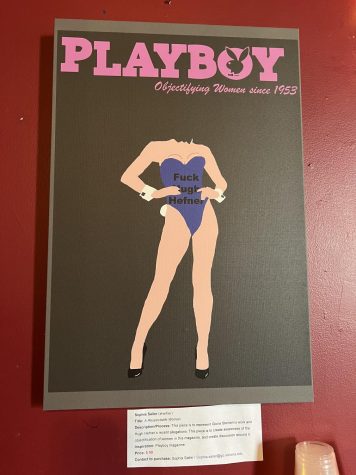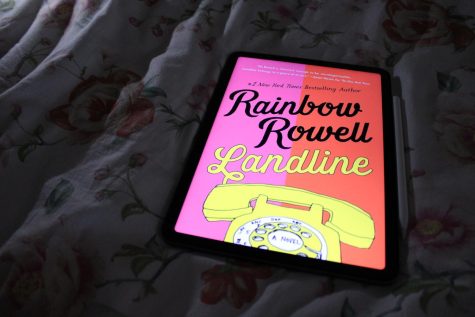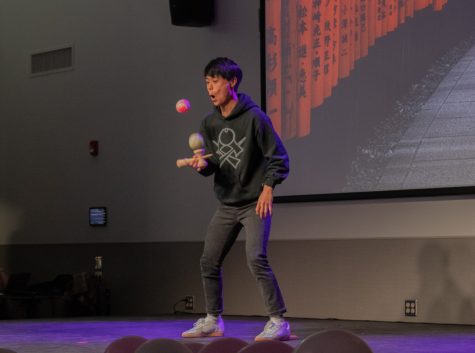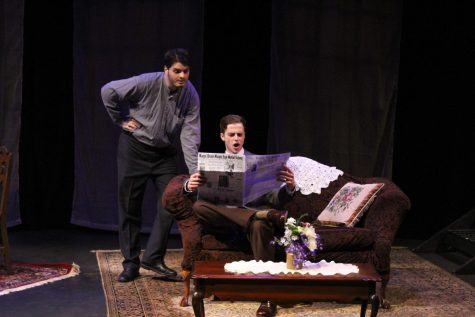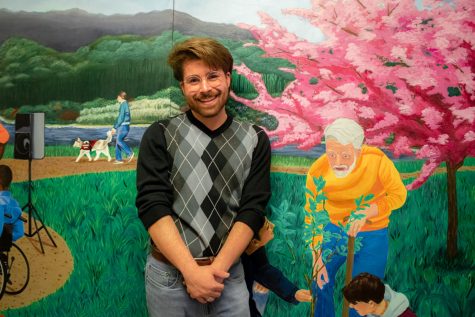Great River Shakespeare Festival plans around COVID
Contributed photo from Great River Shakespeare Festival details the proposed stage layout atop the drain cover.
April 7, 2021
Winona’s Great River Shakespeare Festival announced on March 27 its plans for COVID-19 adaptations to the upcoming summer season.
Precautions for the festival’s 17th season include outdoor venues, as well as pod seating and new audio techniques to permit social distancing.
The festival will feature William Shakespeare’s “The Tempest” and Charles Dickens’ “Great Expectations” at Levee Park. Another location on the Winona State University campus will host Duncan Macmillan and Jonny Donahoe’s “Every Brilliant Thing.”
Adaptations to facilitate outdoor performance include the permitting and construction of a stage in Levee Park and use of areas near the Winona State University gazebo. The Levee Park set will include a tower, a balcony and mock cell.
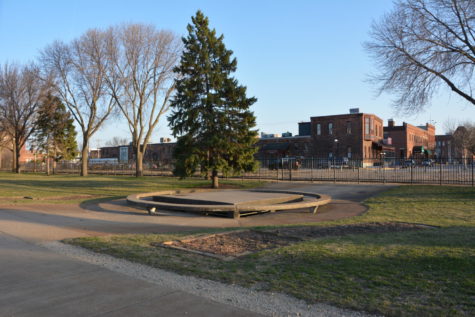
Within the outdoor spaces, attendees will be organized into pods of two, seven feet in diameter, with a six-foot demarcated distance between pods to allow for social distancing. Attendees will be expected to bring their own chairs and wear masks for the productions unless eating.
Outdoor performance during a Minnesota summer brings a slew of changes and challenges, including mosquitos, trains and summer thunderstorms. English professor Myles Weber shared previous experience with outdoor theatre.
“Attending theater outdoors can lend a party atmosphere to the whole thing. But there are risks. I attended an outdoor production by the Washington, DC, Shakespeare Theatre Company, in Rock Creek Park many years back, and–right on schedule–it rained. Hard,” Weber said.
The festival shared plans to cope with weather, including ponchos, postponements and cancellation in the case of an extended downpour.
The shift to outdoor performance was not taken lightly for a variety of factors, according to festival artistic director Doug Scholz-Carlson, also serving as director of “Great Expectations.”
“We really wanted to be indoors, partly because the facility, the theater at Winona State University is perfect for us acoustically. It’s just a really friendly space. So that way we can speak the text, with a lot of subtlety in that space.”
Scholz-Carlson described the focus the new environment brings to the productions.
“You have to use your imagination a lot more. We’re not using lighting. The sets are a lot simpler. Costumes become a lot simpler. So, it really is the language. And he [Shakespeare] just thrives in the language and the storytelling,” Scholz-Carlson said. “So our major technical element, well, in addition to building a set or a stage than our major technical element becomes the sound system.”
To project voices outdoors and across socially distanced groups, the festival has developed a unique sound system to catch and broadcast actors’ voices.
“So what we’re doing is we’ve got a series of mics around the edge of the stage and that sort of creates a bubble onstage,”
Scholz-Carlson said. “You’re saying anything on stage that’ll be amplified out so that you can hear it.”
Scholz-Carlson said this speaker amplification works with actors, supplementing, then supplanting their natural projection at distance.
“So, for the people closer in, they will get mostly sort of the natural sound and then a little bit of amplified sound. And then the further back you get, you’ll get still some natural sound and then some amplified sound,” Scholz-Carlson said. “But I think the experience of it is you’re simply going to feel like you can hear, like you’re going to feel like you’re hearing the actors on amplified, but your feel like you can hear them.”
In addition to speaker amplification, individuals can simulcast audio to their individual devices, eliminating any need for proximity to the stage. Scholz-Carlson spoke to the digital system in use that broadcasts from a transmitter to individual phones, much like audio at drive-in theatres.
“You can use the headphones on your cell phone. And that will have all the sound from the show,” Scholz-Carlson said. “So, no matter how far back you are, you’ll hear it really clearly as if the actors are standing right next to you.”
The Winona State production will use a similar setup, utilizing boom microphones to capture actors’ voices and broadcast them across the center of campus.
In addition to changes on stage, the entire company had to adapt behind the curtain to take precautions against COVID. Festival managing director Aaron Young detailed some of the adaptations the festival took to limit risk.
“We rent the East Lake apartments from the University. But we’re needing to rent more this year so that we can space people out more. And then doing things like not letting departments live in the same apartment. So we make sure that the costume people are spread out among all of the other apartments.” Young said. “That the actors are spread out. Because if we have to quarantine an apartment, we don’t want to lose, like our entire props department or two-thirds of our acting company.”
Young emphasized how impressively actors have adapted to the obstacles of COVID.
“We can say, you know what? Your show now has to be less than two hours long. Needs to be outdoors. And you need to rethink your plans completely because we can’t have all these special effects that you’re thinking of in the theatre. And just to see that everyone’s creativity is like, Hey, yes, I can do that. I can, I can take the variables that are given to me and I can still create something that is meaningful.
Weber echoed the quality of the festival’s productions and performance regardless of Winona’s size.
“When I first moved to Winona, I figured I would have to take the train to Chicago or drive up to the Twin Cities to see first-rate theater, which I do. But when I first attended the Shakespeare festival in town, I realized the productions here were of the same caliber as those of professional theaters in the major cities.”
The festival will have a variety of tickets available, from reservable pods, to general admission areas at the Winona State location. Eileen Moeller, marketing and sales director of the festival, emphasized the festival’s commitment to a low barrier of entry.
“There will be a pay what you will option for every single performance.” Moeller said. “So, if you just show up day of, and all you have is a dollar or we’ll also accept donations of non-perishable food for the food shelf. So, if you have some cans or boxes of mac and cheese, come try it out.”
Moeller urged students to take advantage and get involved with the festival.
“I really would love to see more students at our productions. I think there’s something there for everyone and I hope that people take advantage this year of the pay what you will option and the sort of more laid-back atmosphere of being outdoors,” Moeller said. “And we hope students will just give it a try and, and come on down because it’s, it’ll be really cool.”
Managing director Aaron Young echoed similar comments for Winona State students.
“My advice really would be just come and, and allow yourself to get carried away in the experience. And, and sometimes that’s going to be hard outdoors because there’s so many distractions.” Young said. “But give yourself the opportunity to get carried away and see what happens.”























































